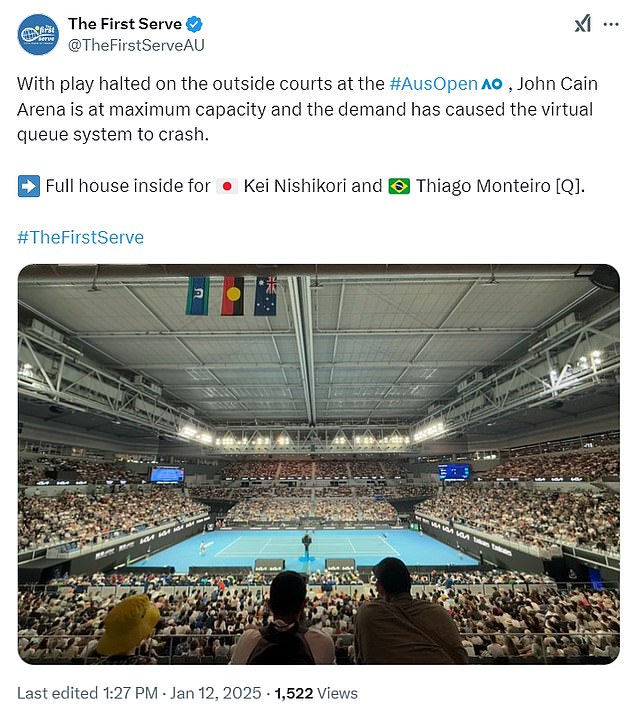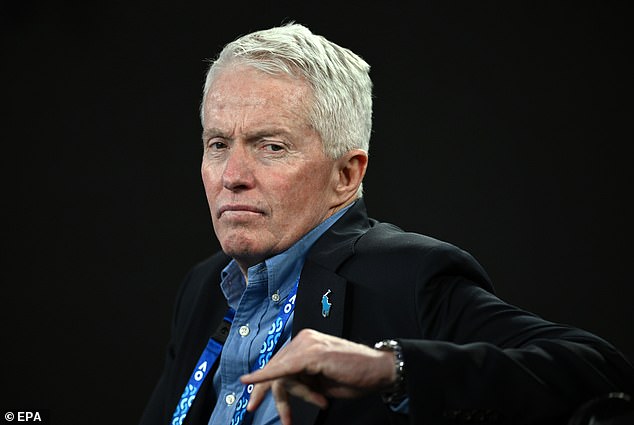- Fans left locked out of big matches have been left fuming
- Advice from grand slam organisers did not help
Aussie tennis fans have demanded refunds after being locked out of marquee matches at the Australian Open because the tournament’s new virtual queue technology crashed.
John Cain Arena and Margaret Court Arena uses a virtual queue system to manage unreserved seating at the Australian Open.
Introduced in 2024, this system allows fans with ground passes to scan a QR code displayed at the arenas, adding them to a waitlist.
When seats become available, fans receive an SMS notification and have 30 minutes to claim their spot.
The virtual queue aims to reduce physical waiting times, enabling attendees to explore Melbourne Park’s amenities while awaiting seating.
However, technical issues related to a QR code disrupted the system at John Cain Arena from just day three of the tournament, leading to the implementation of a manual wristband process.


Fans were required to obtain wristbands at designated times to access the arena, causing confusion and dissatisfaction among attendees.
Wristbands had run out on Tuesday before Australia’s Alexei Popyrin took the court.
The system crashed again on Thursday, leaving many fans locked out of the premium matches because organisers had run out of wristbands or they had not been able to physically line up during the day to secure one.
Organisers placed signs in John Cain Arena advising spectators about the situation but it only served to infuriate fans.
‘The virtual queue for arena passes is temporarily closed,’ they said.
‘While you wait, please enjoy the tennis action on the big screens at Grand Slam Oval or Garden Square.’
In a statement provided to News Corp, Tennis Australia said: ‘There was an issue with the virtual queue technology at JCA this morning.
‘Staff admitted fans manually and play started on time. The provider has resolved the issue.’



Australian Open organisers are yet to make comment on the issues they have experienced with the virtual queuing system.
However, frustrated tennis fans have taken to social media to lash organisers over the situation, with many asking for refunds on Thursday night.
‘Wristband system being used at John Cain Arena for #AusOpen is horrific, if the virtual queue goes down then go back to traditional queuing,’ one fan fumed.
‘This system is allowing for many empty seats and unreserved people being turned away from said seats simply because of a wristband.
‘Also no mention of any wristband system when purchasing tickets, many night ground passes wouldn’t have been sold if people were aware of this flawed system.’
‘Your wristband system does not allow night ground passes holders access to reserved seating,’ raged another.
‘All the wristbands are gone prior to 5pm, when night ground passes holders can gain entry,’ a commenter wrote.
‘Just make it a ticketed court and stop this stupidity Craig,’ another posted in a reference to CEO of Tennis Australia Craig Tiley.

Compounding the situation, a severe storm caused play suspensions on outside courts, prompting more spectators to seek seats in covered arenas like John Cain Arena.
The Australian Open is not the first major event in Australia to experience issues with the virtual queuing technology.
During the 2023 presale for Taylor Swift’s Australian ‘Eras’ Tour, demand overwhelmed systems, with four million fans joining a virtual queue for 450,000 tickets.
Presale tickets sold out within two hours, but fans seeking accessible tickets faced additional challenges. They were directed to book via phone or email instead of Ticketek’s platform, leaving many uncertain.
The situation led to calls from disability advocates to boycott events that fail to provide inclusive access.
‘You have to call a special line and then leave a message, and then await a call back for when someone has time to call you back,’ Dane Cross, senior advisor for Advocacy and Access at Spinal Life Australia said.
‘It’s just been such a poor experience in the past, that I’ve chosen to not attend events.’

